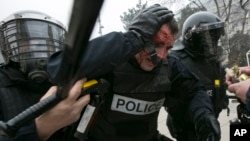At least 37 people were injured Tuesday, including 22 policemen, during violent unrest in Kosovo's capital, Pristina.
Police fired tear gas and water cannon to disperse several thousand anti-government protesters demanding the resignation of a Serb Cabinet minister accused of insulting the ethnic Albanian majority.
The protesters threw stones, Molotov cocktails and other objects at riot police.
The Head of the Organization for Security and Cooperation in Europe (OSCE) Mission in Kosovo, Ambassador Jean-Claude Schlumberger, strongly condemned the violence. “People have the right to protest, but they should express their grievances peacefully."
Violence is not the answer,” said Schlumberger. “All parties should act responsibly and resort to political dialogue as the only way forward.”
The OSCE Mission in Kosovo said it will continue to closely monitor the situation and will stand ready to contribute to defusing tensions.
The clashes followed a week of demonstrations organized by opposition parties, who are calling for the dismissal of Labor and Social Welfare Minister Aleksandar Jablanovic.
Jablanovic sparked indignation two weeks ago when he called a group of Albanians who lost family members in the 1998-1999 war "savages" for trying to prevent Serb pilgrims from visiting a monastery in Kosovo on Orthodox Christmas. The group had claimed "war criminals" were among the pilgrims.
Jablanovic later apologized publicly, but angry crowds have continued to demand his resignation.
Prime Minister Isa Mustafa included three Serb ministers in his 21-member Cabinet, aiming to improve relations with Kosovo's Serbs, who do not recognize the country's independence.
Kosovo's independence from Serbia, which it declared in 2008, has been recognized by more than 100 countries.
About 10,000 people died after Serbian troops launched a campaign of ethnic cleansing in 1998 to rid Kosovo of ethnic Albanians demanding greater autonomy. The violence was halted by NATO's 78-day bombing of Serbia in 1999.





